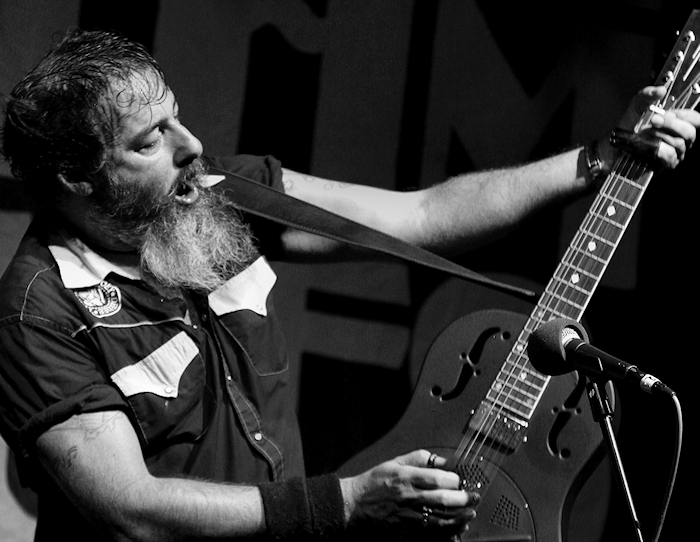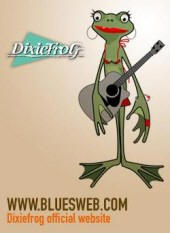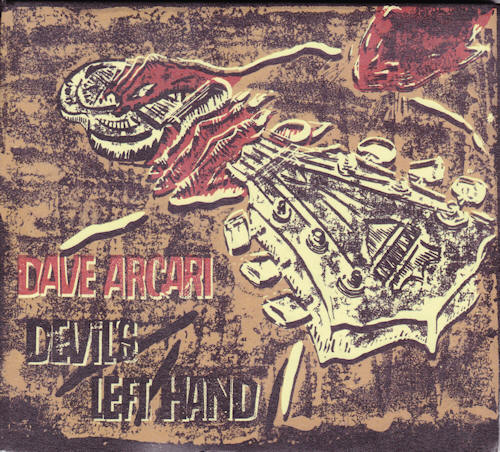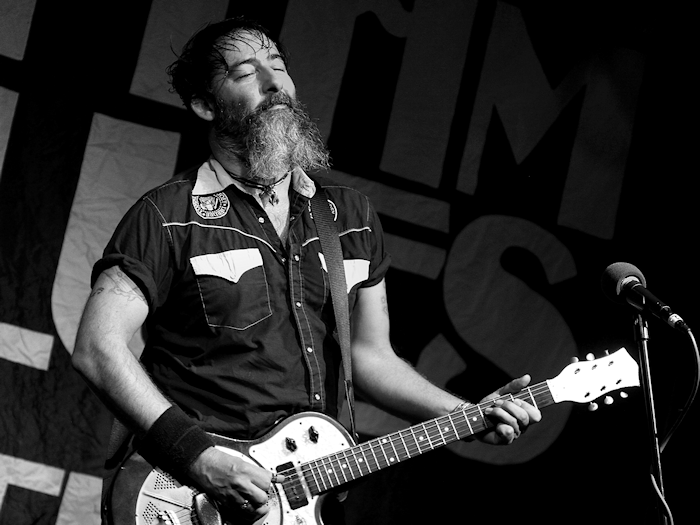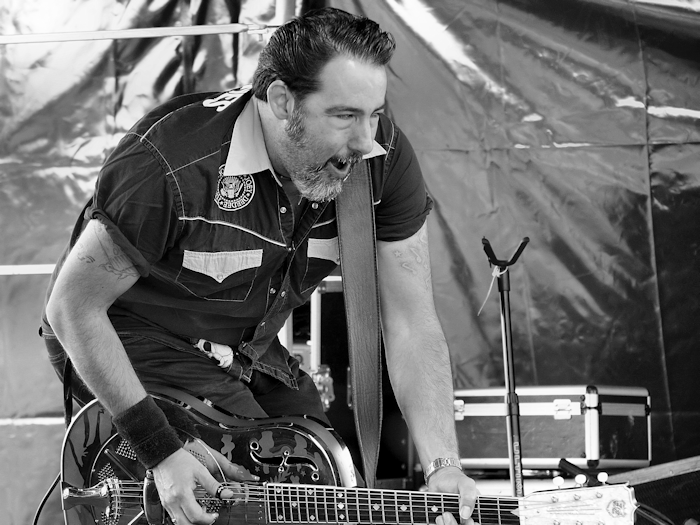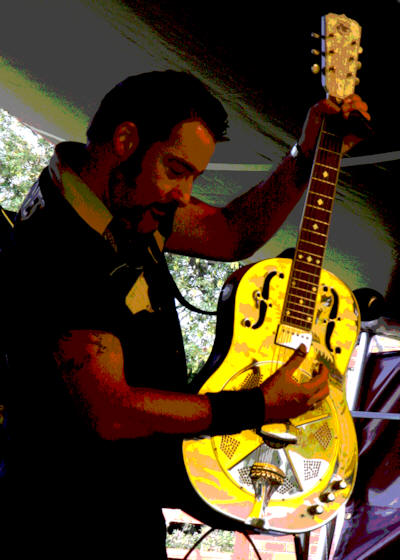
Painting © 2004 Loz
Arkle
Website
© Copyright 2000-2011 Alan White - All
Rights Reserved
Site optimised for Microsoft Internet Explorer
Early Blues Interview
|
|
"SLIDE guitarist & songwriter Dave Arcariís alt.blues sounds owe as much to trash country, punk and rockabilly as they do pre-war Delta blues and have been showcased via six internationally-acclaimed solo CD releases.
With more than 100 UK dates a year plus regular shows in Finland,
Estonia, France, Germany, Belgium, Poland and Canada, Arcari is one of
the hardest gigging live artists on the circuit. A series of shows with
folks including Steve Earle, Alabama 3, Seasick Steve and Jon Spencer
along with his relentless UK and European tour schedule have established
Arcari as a formidable international solo performer who is fast building
a media reputation as a 'hell-raising National guitar madman'".
After seeing a 'buzzing' performance at the Upton Blues Festival last year I met up with Dave at this year's Great British R&B Festival in Colne: Alan: What are your first musical memories growing up in Glasgow? Dave: Itís interesting that you ask that because Iíve just done a radio show in London which was based around this and I did a wee session and had to take some music in. I started off the compilation CD with a Johnny Cash tune called 25 Minutes to Go, which was one of the very first things I remember hearing and liking. I remember that I liked the sound of it but I didnít really know what it was but I was probably only 7 or 8 years old. A couple of weeks later I went into Woolies with my pocket money and they used to do these double albums for 99p or something like that (decimalisation hadnít even come in by that time). There was a Johnny Cash double album so I bought it, and I still have it, and it turned out to have a lot of the Sun sessions stuff on it and it was brilliant but it didnít have this 25 Minutes to Go. After that from the pop charts I was drawn towards Alvin Stardust, more so than Gary Glitter because Alvin Stardust was kind of dressed in black and he was a bit more 50s and rock and roll influenced and Gary Glitter was a bit more glam. So Alvin Stardust, you heard it first here, Iíll never live it down. But I still have all his LPs and if I ever got the chance to go and see him Iíd be there like a shot, I thought he was awesome.
Alan: Did you come from a musical family? Dave: Not really, my Dadís dad was a violin teacher but we are talking about the late 19th century here, and my Dad played a little bit of guitar on an old gut-strung Spanish guitar which wasnít very beginner friendly and he had another one that I used to play with a big old penny (using it as a plectrum). Alan: Did you always want to become a musician? Dave: Maybe sub-consciously. But I think I was kind of scarred for life because as a kid I was only ever allowed to be in the school choir if I didnít make any noise and was only allowed to move my lips. I was usually kicked out of the music class, as with a lot of other classes as well, because they thought I was taking the piss because I couldnít hear one note from the other, I was told I was tone deaf, flat, but some things never change. So, not it wasnít until much later that I decided to be a musician although I did used to jump up and down on my bed with a microphone into the tape recorder and doing Alvin Stardust impressions for my granny. Alan: How did you get started in music? Dave: I left school and I was working in a bank which I did for about four years before becoming a debt collector. One year at the bank I spent my Christmas bonus on an acoustic guitar when I was about 18 or 19 years old. Forty nine quid [£49] Harmony Sovereign from Biggars in Sauchiehall Street, Glasgow and I remember my parents saying how much of a waste of money that will be stuck under the bed, but I got a little book with a tune of the day playing Bob Dylan songs and that got me started. Alan: So what kind of material did you start with? Dave: Bob Dylan tunes and then I started listening to Heavy Metal and then I started listening to Bowie and Lou Read, stuff like that. Then when I got into the acoustic guitar I suppose you start looking for the stuff that you canít play but aspire to, so early Bob Dylan - particularly the early albums, and Neil Young. I suppose now folk play Oasis tunes when they buy a guitar but for me it was Dylan stuff. Alan: What first attracted you to the blues?
Alan: What does the Blues mean to you? Dave: It means punk, it means rockabilly, it means playing from the heart. It does kind of mean a rootsy ... not too formulaic but based on a similar pattern and feel but the interpretation of it is boundaryless.
Dave: Had I been able to play in a normal fashion and been good at learning stuff I would probably have started to play covers. But I was never any good at learning by rote or parrot fashion and I didnít really have an ear to pick it up or the memory to remember it even. So I started doing things my own way and that in itself spawned a make-do and mend style that really itís by default rather than by design because I didnít really know how to do it. And I think that what I do is really my effort at trying to recreate what I hear in my head, although what I hear in my head and what I do sometimes arenít the same thing! So itís a melting pot of all the things I like from 50s rock and roll, country, rock-a-billy, punk, everything I like. Alan: You regularly play solo but you are also in the Radiotones band. Are they still going? Dave: Yeesss, but we are doing less and less and only do about two gigs a year. The guys have got day jobs and one of the reasons I started on my own was because itís much easier. Gigs would come in, I'd start phoning people, they wouldnít reply, then youíd get a text message to say they can't do it, so after youíve begged a promoter for a gig and theyíve finally given you a date and then you have to get back and say you canít do it; that's not so good. So, yes, Radiotones does very much exist. Itís alive, maybe not kicking, but it's alive. Alan: How did you start up with the Radiotones?
Alan: Apart from touring, you run guitar and song-writing workshops, you do seminars and lectures; I guess you have a lot of fun doing all that? Dave: Yes, lots of fun. Every so often thereíll be something special like in Estonia I did a slide guitar workshop Masterclass, opening up the realm of slide guitar. I really enjoy doing all that stuff. Alan: Whoís influenced you the most in your music writing and playing? Dave: Probably somebody like Blind Willie Johnson, Booker White, all the folk who knocked the hell out of guitars and didnít particularly care about blues but they just did their thing and it got called blues. Also some of the more cowpunk ['country punk'], trash-country comes in there because it can be a bit limiting if it gets just stuck in a blues thing, so I think there's some influence in that as well. Alan: Looking back at your career so far, what are your fondest memories? Dave: Oh, everything, just everything. Thereís nothing that I wouldnít do, or change or not have done because weíve just had an absolute blast. Thereís so much stuff marked our progression to going full time so I think a lot of the things since then have probably been more significant in terms of perception, like last yearís gig with Steve Earle with fantastic and he turned out to be a really good guy, a couple of shows with Seasick Steve and he gave me a bit of a helping hand here and there, and a lot of festivals, the Great British R&B Festival here in Colne is always fantastic, always a good time, meeting up with some cool folk. Some of the festivals abroad I would be pushed to pick. Iíve been very lucky.
Dave: Of my Nationals, itís a technical term, but itís probably my black guitar. Itís a custom guitar because Iíve got an artistsí deal with National so they custom build and make little tweaks here and there. Itís based on a Delphi, which is a steel body with a black powder finish they built in the highlander pickup for acoustic sounds and also a humbucker so itís flexibility with sound. They made all their guitars with flat headstocks so when I break guitars or get stung by wasps [as actually occurred at the Upton Blues Festival] I can change the strings reasonably quickly. Alan: Are there any particular songs that you play that have special meaning to you? Dave: Most of the songs Iíve written myself are probably based subconsciously on whatís happening at the time or whatís happened recently. Alan: A few years ago you put music to Robbie Burnsí poem, Parcel of Rogues, for BBC Scotland and also presented the programme, interviewing high profile political figures, musicians and historians. Tell me about that experience. Dave: The production company got this guy, not really a blues guy, called Rab Noakes who used to be head of music at Radio Scotland. It was 300 years since the Act of Union between England and Scotland and somebody had put a pitch in for a programme about the Rabbie Burns poem Parcel of Rogues which referred to the Act of Union. The original idea was to get me to set the poem to music and turn it into a Dave Arcari tune so it took me five minutes to write the song, and 3 months to learn the words. But then it grew arms and legs and they decided that they wanted me to do interviews as well with other folk and record parts of the song in different places like a verse in Burnsí mausoleum and another verse on the Scott monument. It was a great success. The programme went really well and then we released the song as a single and it became one of my biggest downloads. Subsequently I got asked to do a concert for the year of homecoming and I was asked to perform this and another song, clearly not knowing the kind of thing I do. I suggested that this might leave some of his audience in shock as they were all the cream of Scottish Celtic and folk, so this guy wrote out the words to another Burns poem called McPhersonís Lament.
Dave: Yeah, that was a great shock and surprise. But very happy. Alan: When I first heard the album, I thought "McPherson's Lament" was shaping up as an old delta song, but it's Rabbie Burns, isn't it? You then follow that with Johnny Cash's "Blue Train". Not you typical blues album covers? Dave: No, not really. The BBC were organising a Johnny Cash tribute and asked if I could do something. I did a Leonard Cohen one for them too and I did a slide guitar version of Chelsea Hotel, but I was never comfortable enough with it to try to do it again. But the one I did for the Johnny Cash night was that, and it's stayed in my set virtually ever since.
Alan: Keeping with the unconventional theme, your plans are to record a new album in Helsinki? Dave: Two years ago when I
first played the acoustic stage at Colne the guys from the Blues Autour
du Zinc Festival in France were here and asked if Iíd be interested to
play their festival the following
Alan: Not so much a one man band - more a one man music industry, you do everything yourself, music, workshops, album production, artwork, photography, serious social networking with your website, blog, Facebook, Twitter, etc.; how do you have time to fit it all in? Dave: It is kind of hard, although itís not so bad when weíre at home. Margaret does all the gig booking and tour management, all the tour logistics, travel, merchandising and all that. But the thing that suffers is that almost the only time I play my guitar is on a gig and usually as is happening right now Iím panicking because itís Colne today, Belfast tomorrow, we are in Ireland for a few days, the back with gigs all next week and then Iím in the studio again, so I donít get enough time to do the song writing. Alan: How do you see the future of blues music? Dave: I think there seems to be some kind of rising undercurrent. I donít know if its a cyclical thing, but the last few years it does some to be on the rise and people are a bit more receptive to it. I think that at last people are now realising that blues music isnít necessarily what they think it is, partly helped by people like Seasick Steve on Jools Holland. I think it will continue to grow but it is a thin line Ė where does it stop being blues and how do you push it whilst still retaining the heart of it? I never go beyond three chords but it can be a problem and the challenge is to keep it blues but present it slightly differently and not fundamentally changing it. All the people here at Colne have so many different styles and show how it can be taken to new audiences. Alan: Thank you so much Dave, I really appreciate your time. _________________________________________________________________________
Check out Dave Arcari at the Great British R&B Festival 2011
Check out Dave Arcari's stinging performance at the Upton Blues Festival 2010
_________________________________________________________________________
Return to
Blues Interviews List |









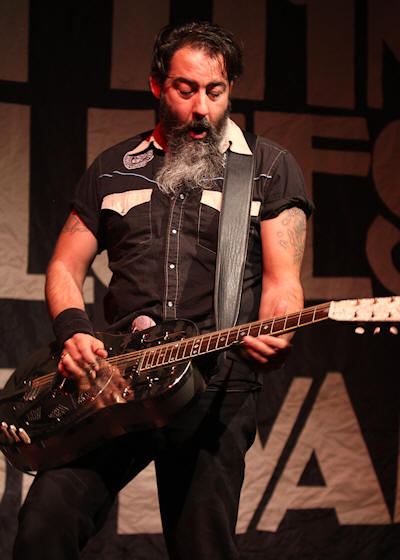
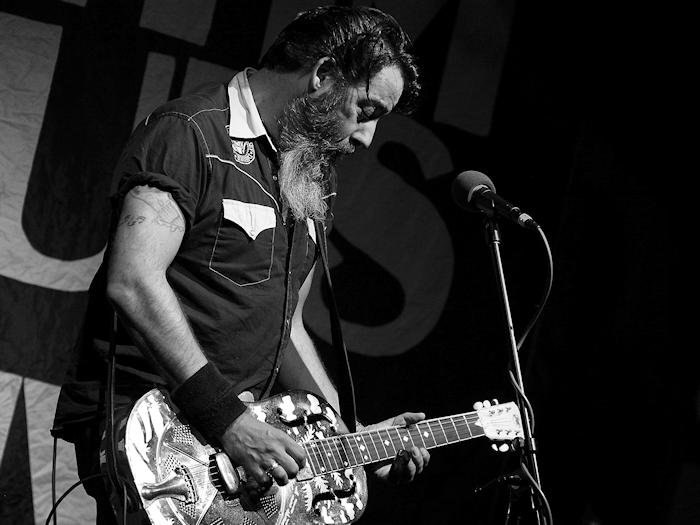
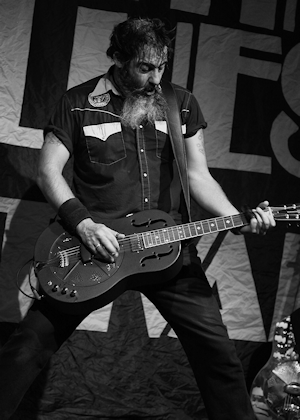 Dave:
I had been playing guitar for a year or two, not getting on terribly
with it and then there were two things that happened simultaneously.
None of my pals played any musical instruments, although they liked
listening to music and then I bumped into this guy who was quite a good
guitar player and he came up to the house to have a jam, but I didnít
know what a jam was. I suppose having a jam often begins with blues
because itís a fairly straightforward form, although not being able to
count to 3 let alone 12 posed a bit of a problem for me but I kind of
got my head around that. At almost exactly the same time I used to go
down to a pub in Glasgow called the Ben Nevis and it was an Irish pub
and on Sunday night they had a duo, a pedal-steel player and a guy
playing the guitar and singing, it was all country stuff, and in the
second half people could got up and sung with them. The guy got a new
PA system and he used to have this echo unit, a tape basically called a
'WEM Copicat' and I asked him if I could buy the old Copicat. He said,
ďWhy, do you play?Ē so the conversation started about me learning, so he
said, ďWell, come next week, play a couple of songs and you can have the
Copicat.Ē So I had to get up and do ďBlowing in the WindĒ or
something, it was probably God-awful, but then I started going every
Sunday night and after a few months for some reason I went to another
pub, called The Exchequer with a guy called Big George playing. And
that was it, he totally blew me away and I never went back to the Ben
Nevis. It was a pivotal moment.
Dave:
I had been playing guitar for a year or two, not getting on terribly
with it and then there were two things that happened simultaneously.
None of my pals played any musical instruments, although they liked
listening to music and then I bumped into this guy who was quite a good
guitar player and he came up to the house to have a jam, but I didnít
know what a jam was. I suppose having a jam often begins with blues
because itís a fairly straightforward form, although not being able to
count to 3 let alone 12 posed a bit of a problem for me but I kind of
got my head around that. At almost exactly the same time I used to go
down to a pub in Glasgow called the Ben Nevis and it was an Irish pub
and on Sunday night they had a duo, a pedal-steel player and a guy
playing the guitar and singing, it was all country stuff, and in the
second half people could got up and sung with them. The guy got a new
PA system and he used to have this echo unit, a tape basically called a
'WEM Copicat' and I asked him if I could buy the old Copicat. He said,
ďWhy, do you play?Ē so the conversation started about me learning, so he
said, ďWell, come next week, play a couple of songs and you can have the
Copicat.Ē So I had to get up and do ďBlowing in the WindĒ or
something, it was probably God-awful, but then I started going every
Sunday night and after a few months for some reason I went to another
pub, called The Exchequer with a guy called Big George playing. And
that was it, he totally blew me away and I never went back to the Ben
Nevis. It was a pivotal moment.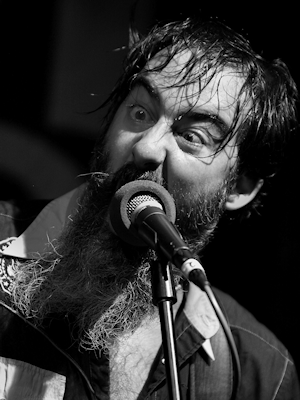 Alan:
Iíve got a quote about you here: ďA truly authentic UK blues
artist ... a hell-raising National guitar madmanĒ. Itís hard to
pigeon-hole what you do, so - going by your own description - what
exactly is ďf**ked up alt blues" or "alt blues thatís gonna curl the
Devilís tailĒ?
Alan:
Iíve got a quote about you here: ďA truly authentic UK blues
artist ... a hell-raising National guitar madmanĒ. Itís hard to
pigeon-hole what you do, so - going by your own description - what
exactly is ďf**ked up alt blues" or "alt blues thatís gonna curl the
Devilís tailĒ?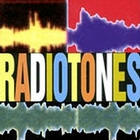
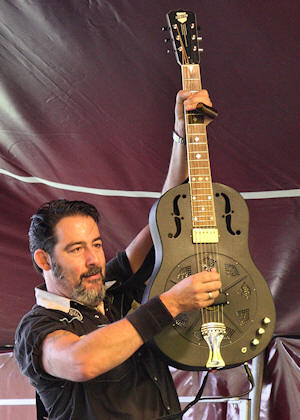 Alan:
Whatís your favourite guitar?
Alan:
Whatís your favourite guitar?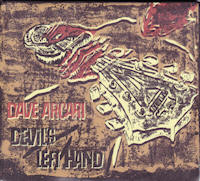 Alan:
Your latest album, Devilís Left Hand, has been getting rave
reviews. This must be a big buzz for you especially as itís got two
nominations for the British Blues Awards.
Alan:
Your latest album, Devilís Left Hand, has been getting rave
reviews. This must be a big buzz for you especially as itís got two
nominations for the British Blues Awards.